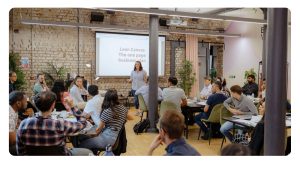< Back to Blog
Since the Covid boom, games funding has undergone a sharp correction: the “tourist” VCs who rushed in during lockdown hype have largely exited, leaving behind a far stricter, metrics-driven environment where traction and retention matter more than glossy decks. Geography is shaping outcomes too; US salary inflation makes European studios more capital-efficient, while Turkey has emerged as a surprising hotspot for mobile talent, with Dream Games alumni spawning a new wave of startups.
At the same time, AI has so far delivered more on the supply side (e.g. cheaper, faster production) than on the player side, where true innovation is still awaited and the continued democratisation of game tech (e.g. Roblox Studio, Steam Workshop), continues to echo Unity’s earlier revolution.
Against this backdrop, the UK has a particular opportunity: to build stronger bridges between public grant programmes and private venture capital, ensuring that early experiments can graduate into globally competitive, scalable companies.
Two paths, similar goals
As part of Baltic Ventures’ Games Tech Start Up Program, I recently listened in on a panel expertly chaired by our Lead Coach Rebecca Robinson. Gus Curley is a Principal at London Venture Partners (LVP), a gaming-focused venture capital fund investing exclusively across the games ecosystem. Colin Macdonald is Portfolio Manager at the UK Games Fund. Their aim is to boost the UK’s games business and talent ecosystem and they want their funding to create jobs, promote diverse new teams, enhance skills and increase the amount of new games IPs in the UK.

One speaks the language of scale, exits and user metrics. The other speaks of cultural value, creative risk and steady public support. Both believe in the UK’s potential but with different speed, different risk, different reward.
Gus wants stories backed by numbers. He’s looking for teams who’ve moved beyond prototypes: studios with growing audiences, sticky retention, meaningful monetisation. He invests more than cash; he invests pressure: the pressure to build a company, not just ship a game.
Colin wants ideas to breathe. Public money is there to generate creative work, spread culture, create economic value, even if it takes time. The risk is lower, the expectations different. But the discipline is still there: match funding, clear milestones and applications that demonstrate fit with the fund’s mission.
What the UK games ecosystem needs
Here’s what this dual-path model means for UK games to truly level up:
Early-stage talent + proof of concept
The pipeline of ideas in the UK is strong. Just look at the number of university grads, indie devs and emergent studios all over the country. But many need room to show the early promise, whether it’s through grants or small seed rounds, before they are ready for VC.
Think Company; not just Game!
Founders need to raise their sights earlier. The question isn’t just “can I finish this first game?” but “what kind of company do I want to build? National, global, multiplatform?” Public funding can provide the springboard to test ideas and prove early potential, but it is venture capital that pushes teams to go further: to transform one title into an IP portfolio, to build recurring revenue models and to create businesses that can scale beyond the life of a single project.
Stronger public-private bridges
If more investors, publishers, infrastructure companies align with public funders, we can create smoother transitions. Imagine programmes that move teams from grant rounds into venture capital without crashing into valuation misconceptions or equity mismatches.
Sustained support, beyond short cycles
One of the biggest risks with public funding is its short horizon. If you succeed one year, what about the next? Similarly, VCs often expect fast scaling. In an ideal environment, patience and ambition co-exist: public programmes don’t “just seed” and venture funds don’t “just exit”.
The reality check
Public funds are competitive. You’ll need to show a strong match to the criteria. Miss a detail, fail to articulate jobs or impact, or look generic and you will not be chosen. VCs are more risk-acceptant financially, but far less forgiving on performance. If you don’t move fast enough, or your metrics slip, you lose traction. Combining both routes is not easy. Founders often try to juggle grant deliverables and venture growth metrics and that can dilute focus.

What’s at stake
Creative innovation in games comes from early-stage ideas that often rely on public support, but their impact reaches far beyond the prototype stage. When game companies expand, they generate jobs, attract export revenue and create valuable spillovers of talent across the wider economy. At the same time, games have become central to the UK’s cultural footprint, shaping how the country tells stories, builds enduring IP and engages with global audiences.
Top tips founders can start with today
Gus and Colin shared plenty of useful insights. Here are my takeaways that founders who are thinking about their own growth journey, can do now:
- Map out your requirements before you need every pound. Identify which public funds could support you early; which VCs share your vision later.
- Make sure your first grant application is excellent: aligned narrative, precise answers, clear metrics on what success looks like (even in early-stage).
- When talking to investors, lead with metrics and scale vision and not just creative passion. Show demand; show retention; show you understand monetisation.
- Seek mentors and networks that have navigated both worlds. Founders who’ve moved from public funding to venture backing are priceless sources of lessons.
- Sign-up to the Games Opportunities newsletter, a monthly roundup of funding and other opportunities for games studios: https://www.gamesopportunities.com/
The UK has every ingredient to build not just studios, but globally competitive companies that define the next generation of games. But it won’t happen by accident. It will happen by design: ambitious founders, aligned funds and an ecosystem that doesn’t settle for good enough.